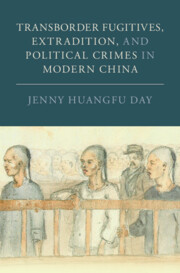Refine search
Actions for selected content:
758 results
Chapter 12 - Ankh-Morpork, Anti-Utopia
- from Part IV - Case Studies
-
-
- Book:
- The Cambridge Companion to British Utopian Literature and Culture since 1945
- Published online:
- 18 December 2025
- Print publication:
- 31 January 2026, pp 244-269
-
- Chapter
- Export citation
7 - “Popular Sovereignty” and the Declaration of Independence
-
-
- Book:
- The Cambridge Companion to the Declaration of Independence
- Published online:
- 18 December 2025
- Print publication:
- 22 January 2026, pp 90-108
-
- Chapter
- Export citation
12 - The Domestication of Cybersecurity in Authoritarian Regimes
- from Part II - Case Studies
-
-
- Book:
- Securing Democracies
- Published online:
- 19 December 2025
- Print publication:
- 22 January 2026, pp 273-292
-
- Chapter
-
- You have access
- Open access
- HTML
- Export citation
2 - Self-Determination through Regional Authority
-
- Book:
- New Regional Authorities
- Published online:
- 17 December 2025
- Print publication:
- 08 January 2026, pp 33-61
-
- Chapter
- Export citation
1 - Changing Approaches to Interference in the Global South
-
- Book:
- New Regional Authorities
- Published online:
- 17 December 2025
- Print publication:
- 08 January 2026, pp 1-32
-
- Chapter
- Export citation
7 - Regional Authority and Self-Determination in International Politics
-
- Book:
- New Regional Authorities
- Published online:
- 17 December 2025
- Print publication:
- 08 January 2026, pp 170-184
-
- Chapter
- Export citation
5 - From Non-Interference to African Enforcement
-
- Book:
- New Regional Authorities
- Published online:
- 17 December 2025
- Print publication:
- 08 January 2026, pp 118-145
-
- Chapter
- Export citation
6 - Short-Circuiting Regional Institutions in the Middle East
-
- Book:
- New Regional Authorities
- Published online:
- 17 December 2025
- Print publication:
- 08 January 2026, pp 146-169
-
- Chapter
- Export citation
Chapter 9 - Levelling the Level
- from Part III - Ripples
-
- Book:
- Violent Waters
- Published online:
- 17 December 2025
- Print publication:
- 08 January 2026, pp 250-282
-
- Chapter
- Export citation
4 - Latin America and the Emergence of Regional Authority over Human Rights
-
- Book:
- New Regional Authorities
- Published online:
- 17 December 2025
- Print publication:
- 08 January 2026, pp 88-117
-
- Chapter
- Export citation

New Regional Authorities
- Self-Determination and the Global South
-
- Published online:
- 17 December 2025
- Print publication:
- 08 January 2026
Introduction
-
- Book:
- Everyday Occupation
- Published online:
- 27 November 2025
- Print publication:
- 11 December 2025, pp 1-20
-
- Chapter
-
- You have access
- Open access
- HTML
- Export citation
1 - Occupying China
-
- Book:
- Everyday Occupation
- Published online:
- 27 November 2025
- Print publication:
- 11 December 2025, pp 21-58
-
- Chapter
-
- You have access
- Open access
- HTML
- Export citation
Who’s the sovereign? Legitimating constitutional authoritarianism in interwar Poland
-
- Journal:
- European Law Open ,
- Published online by Cambridge University Press:
- 28 November 2025, pp. 1-15
-
- Article
-
- You have access
- Open access
- HTML
- Export citation
Further Back to the Future: Neo-Royalism, the Trump Administration, and the Emerging International System
-
- Journal:
- International Organization / Volume 79 / Issue S1 / December 2025
- Published online by Cambridge University Press:
- 20 November 2025, pp. S12-S25
- Print publication:
- December 2025
-
- Article
-
- You have access
- Open access
- HTML
- Export citation

Transborder Fugitives, Extradition, and Political Crimes in Modern China
-
- Published online:
- 10 November 2025
- Print publication:
- 30 October 2025
2 - Spies, Masons, and “Purely Communist”
-
- Book:
- In the Shadow of the Vatican
- Published online:
- 23 October 2025
- Print publication:
- 06 November 2025, pp 60-90
-
- Chapter
- Export citation
Conclusions
-
- Book:
- In the Shadow of the Vatican
- Published online:
- 23 October 2025
- Print publication:
- 06 November 2025, pp 205-218
-
- Chapter
- Export citation
2 - Democracy Must Be Defended
- from Part I - Contextualizations
-
- Book:
- Moral Autopsy
- Published online:
- 18 November 2025
- Print publication:
- 30 October 2025, pp 93-132
-
- Chapter
- Export citation
7 - Science, State, and Piracy in the Making of an Imperial Frontier
-
- Book:
- The Kuroshio Frontier
- Published online:
- 11 October 2025
- Print publication:
- 23 October 2025, pp 193-217
-
- Chapter
-
- You have access
- Open access
- HTML
- Export citation
